Events and Activities
Open access article by Celia Spoden on end-of-life decision-making in ALS
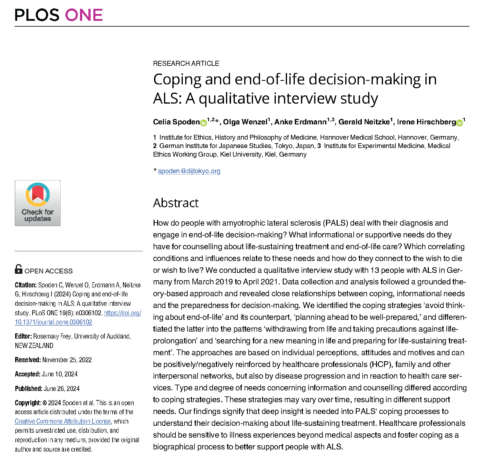 How do people with amyotrophic lateral sclerosis (ALS) deal with their diagnosis and engage in end-of-life decision-making? This new study, co-authored by DIJ researcher Celia Spoden, Olga Wenzel, Anke Erdmann, Gerald Neitzke, and Irene Hirschberg, addresses these and related questions based on qualitative interviews with 13 people with ALS. Data collection and analysis followed a grounded theory-based approach and revealed close relationships between coping, informational needs, and the preparedness for decision-making. The authors identified the coping strategies ‘avoid thinking about end-of-life’ and its counterpart, ‘planning ahead to be well-prepared,’ and differentiated the latter into the patterns ‘withdrawing from life and taking precautions against life-prolongation’ and ‘searching for a new meaning in life and preparing for life-sustaining treatment’. The study recommends healthcare professionals to be sensitive to illness experiences beyond medical aspects and foster coping as a biographical process to better support people with ALS. The article is available open access here
How do people with amyotrophic lateral sclerosis (ALS) deal with their diagnosis and engage in end-of-life decision-making? This new study, co-authored by DIJ researcher Celia Spoden, Olga Wenzel, Anke Erdmann, Gerald Neitzke, and Irene Hirschberg, addresses these and related questions based on qualitative interviews with 13 people with ALS. Data collection and analysis followed a grounded theory-based approach and revealed close relationships between coping, informational needs, and the preparedness for decision-making. The authors identified the coping strategies ‘avoid thinking about end-of-life’ and its counterpart, ‘planning ahead to be well-prepared,’ and differentiated the latter into the patterns ‘withdrawing from life and taking precautions against life-prolongation’ and ‘searching for a new meaning in life and preparing for life-sustaining treatment’. The study recommends healthcare professionals to be sensitive to illness experiences beyond medical aspects and foster coping as a biographical process to better support people with ALS. The article is available open access here
Book chapter by Harald Kümmerle on mathematical knowledge production
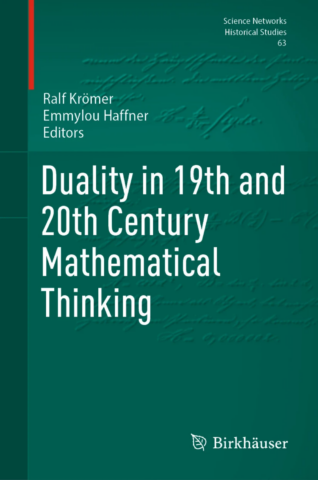 A new book chapter by DIJ researcher Harald Kümmerle analyzes the structure, reception, and production of mathematical knowledge in the early 1930s. Based on a case study of the history of a paper on duality written by the Japanese mathematician Tannaka Tadao in 1938, the chapter provides insights into the development of Tannaka’s research and into processes of cooperative knowledge production, including influences from and exchanges with mathematical communities in Japan and abroad. “Tannaka Tadao‘s 1938 paper on the duality of noncommutative topological groups and its historical background” is published in Duality in 19th and 20th Century Mathematical Thinking (Science Networks. Historical Studies series, vol 63. Cham: Birkhäuser 2024), edited by Ralf Krömer and Emmylou Haffner.
A new book chapter by DIJ researcher Harald Kümmerle analyzes the structure, reception, and production of mathematical knowledge in the early 1930s. Based on a case study of the history of a paper on duality written by the Japanese mathematician Tannaka Tadao in 1938, the chapter provides insights into the development of Tannaka’s research and into processes of cooperative knowledge production, including influences from and exchanges with mathematical communities in Japan and abroad. “Tannaka Tadao‘s 1938 paper on the duality of noncommutative topological groups and its historical background” is published in Duality in 19th and 20th Century Mathematical Thinking (Science Networks. Historical Studies series, vol 63. Cham: Birkhäuser 2024), edited by Ralf Krömer and Emmylou Haffner.
DIJ mourns death of Kiyonari Tadao (1933-2024)
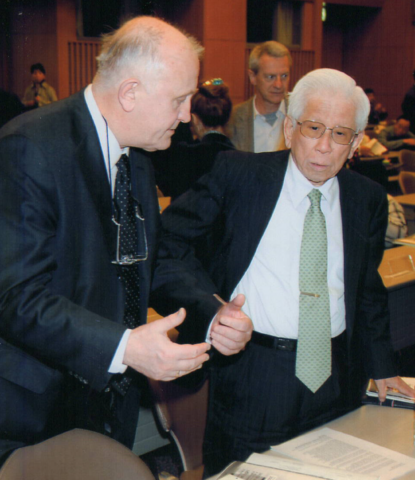
The DIJ mourns the loss of Kiyonari Tadao, who passed away on July 23 at the age of 91. After studying economics at the University of Tokyo, Kiyonari initially worked for a government organisation in finance. From 1972 until his retirement in 2005, he was Professor of Business Administration at Hosei University in Tokyo. From 1996 to 2005, he also headed the university as president and promoted its internationalisation. He was already associated with Germany during his time as a student and supported the DIJ in many ways after its foundation in 1988, for example by organising the library cooperation that still exists today. In 1994, he played a major role in the preparation and support of a DIJ-organised conference on economic integration and regional development in East Asia. The proceedings of the conference have been published in German in the DIJ Miscellanea series (volume 11, 1995) and also contain a contribution by Kiyonari on ‘Globalisation and Regional Transformation – East Asia and Kyushu-Okinawa’. The photo shows Kiyonari with the founding director of the DIJ, Josef Kreiner, at a symposium at Hosei University in 2008.
Japan-Heft von Forschung & Lehre mit Beitrag von Franz Waldenberger zu Wirtschaft und Demografie
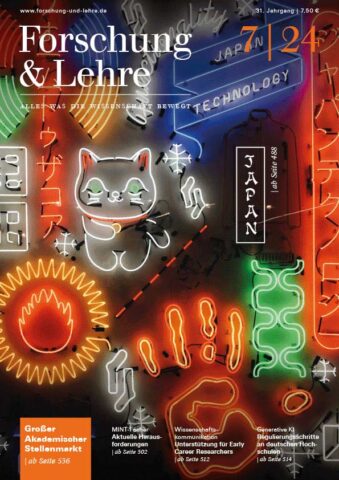 Japan gehört zu den reichsten Ländern der Welt. Gleichzeitig hat das Land den mit Abstand am höchsten verschuldeten Staatssektor. Welche Entwicklungen zeichnen sich – auch vor dem Hintergrund der demografischen Herausforderung – für Japans Wirtschaft und die Staatsfinanzen ab? In seinem Gastbeitrag “Reiches Land – armer Staat: Japans Wirtschaft im Griff der Demografie” erklärt DIJ-Direktor Franz Waldenberger u.a. wie Japans niedrige Arbeitsproduktivität, Alterung, Bevölkerungsrückgang und Japans Geldpolitik zusammenhängen. Angesichts sehr gut ausgebildeter und leistungswilliger Arbeitskräfte sowie einer exzellenten Forschungs- und Entwicklungslandschaft sieht Waldenberger gute Voraussetzungen, die aktuellen Herausforderungen zu meistern. Ebenfalls im Japan-Heft: DIJ-Alumna und ehemalige Beiratsvorsitzende Verena Blechinger-Talcott mit einem Beitrag zum Wandel in Japans Außen- und Sicherheitspolitik sowie der stellvertretende Beiratsvorsitzende David Chiavacci mit einem Artikel zur Arbeitsimmigration und dem Sozialvertrag in Japan. Die gesamte Ausgabe ist hier erhältlich.
Japan gehört zu den reichsten Ländern der Welt. Gleichzeitig hat das Land den mit Abstand am höchsten verschuldeten Staatssektor. Welche Entwicklungen zeichnen sich – auch vor dem Hintergrund der demografischen Herausforderung – für Japans Wirtschaft und die Staatsfinanzen ab? In seinem Gastbeitrag “Reiches Land – armer Staat: Japans Wirtschaft im Griff der Demografie” erklärt DIJ-Direktor Franz Waldenberger u.a. wie Japans niedrige Arbeitsproduktivität, Alterung, Bevölkerungsrückgang und Japans Geldpolitik zusammenhängen. Angesichts sehr gut ausgebildeter und leistungswilliger Arbeitskräfte sowie einer exzellenten Forschungs- und Entwicklungslandschaft sieht Waldenberger gute Voraussetzungen, die aktuellen Herausforderungen zu meistern. Ebenfalls im Japan-Heft: DIJ-Alumna und ehemalige Beiratsvorsitzende Verena Blechinger-Talcott mit einem Beitrag zum Wandel in Japans Außen- und Sicherheitspolitik sowie der stellvertretende Beiratsvorsitzende David Chiavacci mit einem Artikel zur Arbeitsimmigration und dem Sozialvertrag in Japan. Die gesamte Ausgabe ist hier erhältlich.
Open access article by Dolf Neuhaus on Japanese-Korean Protestant encounters
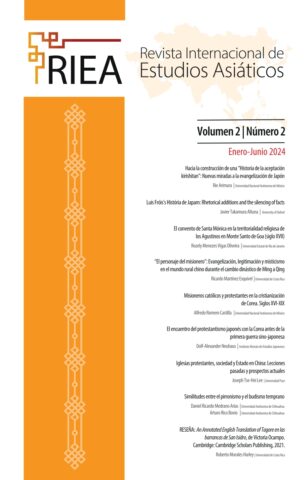 A new, open access article by DIJ historian Dolf-Alexander Neuhaus analyzes the early interactions between Japanese and Korean Protestants who came to Tokyo to study between 1880 and 1895. The article argues that this encounter played a crucial role in generating enthusiasm among Japanese Protestants to disseminate their religious teachings in Korea through evangelization. Divided into three parts, the article first contextualizes the rise of Protestantism in relation to the evolving bilateral relationship between Japan and Korea; second, it delves into the interactions between Korean students and Japanese Protestants in the early 1880s; and third, it examines the emerging debate among Japanese Protestants regarding the potential for missionary activities in Korea. The article “El encuentro del protestantismo japonés con la Corea antes de la primera guerra sino-japonesa” (The encounter of Japanese Protestantism with Korea before the first Sino-Japanese War) is published in Spanish in the Revista Internacional de Estudios Asiáticos (vol. 3, no. 1) and can be downloaded here
A new, open access article by DIJ historian Dolf-Alexander Neuhaus analyzes the early interactions between Japanese and Korean Protestants who came to Tokyo to study between 1880 and 1895. The article argues that this encounter played a crucial role in generating enthusiasm among Japanese Protestants to disseminate their religious teachings in Korea through evangelization. Divided into three parts, the article first contextualizes the rise of Protestantism in relation to the evolving bilateral relationship between Japan and Korea; second, it delves into the interactions between Korean students and Japanese Protestants in the early 1880s; and third, it examines the emerging debate among Japanese Protestants regarding the potential for missionary activities in Korea. The article “El encuentro del protestantismo japonés con la Corea antes de la primera guerra sino-japonesa” (The encounter of Japanese Protestantism with Korea before the first Sino-Japanese War) is published in Spanish in the Revista Internacional de Estudios Asiáticos (vol. 3, no. 1) and can be downloaded here
Open call for Gerald D. Feldman Travel Grants for multi-country research projects
 You are an early career researcher looking for funding for research stays abroad of up to one month? If your countries of interest match, why not consider applying for a Gerald D. Feldman Travel Grants for researchers in the humanities and social sciences? Offered by the Max Weber Foundation (MWS), the travel grants allow you to conduct your own research project in two or three of the countries which are home to MWS institutes and branches or at the Richard Koebner Minerva Center for German History in Israel. We particularly encourage applicants whose research includes Japan. Application deadline: 6 October 2024. Please see the full call, list of possible host countries, and application guidelines here
You are an early career researcher looking for funding for research stays abroad of up to one month? If your countries of interest match, why not consider applying for a Gerald D. Feldman Travel Grants for researchers in the humanities and social sciences? Offered by the Max Weber Foundation (MWS), the travel grants allow you to conduct your own research project in two or three of the countries which are home to MWS institutes and branches or at the Richard Koebner Minerva Center for German History in Israel. We particularly encourage applicants whose research includes Japan. Application deadline: 6 October 2024. Please see the full call, list of possible host countries, and application guidelines here
Hybrid Study Group on Male Care Work in Japanese Manga

Over the past three decades, Japanese media productions, especially manga, have primarily been examined with regard to hegemonic images of ‘femininity’ and as indicators of social change. Only few studies have focused on media constructions of ‘masculinity’. In this talk, Ralf Windhab presents preliminary findings of his doctoral dissertation, which analyzes various Japanese manga that depict male characters as protagonists engaging in unpaid household chores. These portrayals contradict the prevailing image of men as the breadwinners of the family and women as the ones responsible for the household. The research presented shows that some male characters are portrayed as weak or partially feminine in accordance with stereotypes and clichés, while others are portrayed as overly masculine. The actual household chores depicted and their frequency, as well as the different motives for the men to participate in household chores, will also be discussed. Details and registration here
Onsite Study Group on Paradigms of Sociality and Family Engagement among Japanese Men
 The ideologies associated with fatherhood in Japan are changing rapidly in tandem with shifting beliefs about family relationships and work-life balance. While many Japanese fathers aspire to be strong presences in their children’s lives, these men often cannot locate in their own emotionally distant fathers any role models for paternal involvement. What does it mean to be a father in contemporary Japan? How does one learn more about child care, especially when the overwhelming amount of parenting information targets mothers? Can fathers find inspiration outside their families, such as by forming supportive relationships with other parents? This talk will explore how some Japanese fathers are pursuing answers to these questions. It draws upon more than two years of ethnographic fieldwork among parenting-focused groups in the Greater Tokyo Area, and considers what these answers might mean for families, the communities in which they live, and wider society. Details and registration here
The ideologies associated with fatherhood in Japan are changing rapidly in tandem with shifting beliefs about family relationships and work-life balance. While many Japanese fathers aspire to be strong presences in their children’s lives, these men often cannot locate in their own emotionally distant fathers any role models for paternal involvement. What does it mean to be a father in contemporary Japan? How does one learn more about child care, especially when the overwhelming amount of parenting information targets mothers? Can fathers find inspiration outside their families, such as by forming supportive relationships with other parents? This talk will explore how some Japanese fathers are pursuing answers to these questions. It draws upon more than two years of ethnographic fieldwork among parenting-focused groups in the Greater Tokyo Area, and considers what these answers might mean for families, the communities in which they live, and wider society. Details and registration here





 Open Access
Open Access
